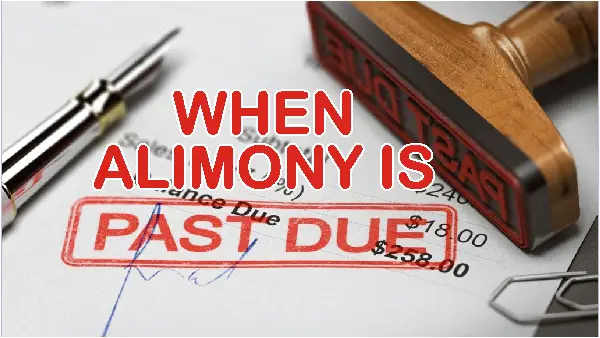
If you are searching for what to do when court-ordered spousal support is not paid by your ex, then this is for you.
The goal of alimony, also known as spousal support, is to assist the receiving spouse in attaining financial stability and independence following a divorce. One question you have to keep in mind is when is alimony considered late?
When the paying spouse fails to pay alimony as ordered by the court, the receiving spouse may be unable to meet her basic necessities. Can you go to jail for not paying spousal support? Yes, you can!
What to do When Your Spouse Fails to Pay Court-Ordered Alimony
There are bound to be consequences if spousal support payment stops. Definitely, the recipient spouse will have their work cut out due to not meeting up with their financial plans that were based on the alimony.
So, to avoid these unwholesome consequences, the spouse needs to take urgent action. But the action taken has to be based on realities on the ground, starting with knowing what went wrong.
Here are what you need to do when court-ordered spousal support is not paid or you need to enforce spousal support back pay:
Find Out Why Your Spouse Hasn’t Paid

Joblessness can be a genuine reason to default on alimony payment
If you aren’t receiving alimony payments as ordered by the court, you should investigate why. Was your spouse’s work involuntarily lost or his or her income reduced due to illness or injury?
If you conclude your spouse is legitimately unable to pay alimony, you should explore reaching an arrangement with him or her that lowers or suspends alimony payments until your spouse returns to work.
However, ensure your spouse understands you’re willing to go to court if the payments don’t resume. You may also consider consulting an attorney to prepare an agreement and guarantee that your rights are completely protected.
File a Motion With The Court
If your spouse, on the other hand, is merely trying to avoid paying alimony or refuses to pay notwithstanding the agreement reached by both of you, you’ll need to return to court for assistance.
You’ll need to seek a judge to force your spouse to make the outstanding payments and avoid defaulting on future payments. This can be done by filing a motion (legal papers) with the court. This is also known as a motion for enforcement or contempt.
If you find yourself in court, you should seek the advice of a skilled family law attorney who knows what to do if alimony is late and can create effective legal motions and defend your claims in court.
Consequences of Not Paying Court-Ordered Spousal Support
Contempt
When spousal support is not paid as ordered by the court, there are substantial implications. Your ex can be forced to pay by having his or her pay docked, having a levy placed on his or her bank account, or having his or her tax refund intercepted by the judge in your case.
When court-ordered spousal support is not paid, a judge can hold someone in contempt of court. The local child support agency may become involved in some circumstances (their job doesn’t just stop at handling child support). When this occurs, the child support agency has the following options:
- Place a lien on his or her property and bank accounts.
- Tax refunds can be intercepted.
- Unemployment, workers’ compensation and disability payouts can all be intercepted.
- Suspend his or her driver’s license, business licenses, professional and sporting licenses, and other licenses.
A judge’s last resort is usually to hold someone in contempt of court. Judges usually do this only when all other options for implementing a spousal support order have failed.
However, you do not have the authority to “prosecute” or ask the judge to do so; it is entirely at the discretion of individual judges.
If your ex-spouse is found in contempt of court by the judge in your case, the repercussions are severe. It’s actually a felony – a misdemeanor – punishable by up to six months in prison.
How to Enforce Alimony Orders
In order to enforce alimony orders or collect spousal support that’s in arrears, you have to appeal to the court, who will, in turn, enforce it through one of the following means
Income Withholding Order

A judge can issue an Income Withholding Order to enforce late alimony payment
An income withholding court order mandates the employer of the spouse not paying alimony to withhold a portion of their salary (about 50%) and transmit it directly to the other spouse for alimony.
This method allows the partner who is in need to receive alimony funds without having to deal with the spouse when court-ordered spousal support is not paid.
Income Withholding Order For Unemployed or Jobless Spouse
Sadly, income withholding orders do not apply to payor partners who are self-employed or jobless. In such a case, you can request the court to mandate your ex to set up a trust account which you can access if you don’t get your alimony on time.
If your spouse is intentionally jobless, you can request a judge to force your spouse to search for employment and/or assign (attribute) some salary to you according to his or her potential earnings (what a person could be able to earn based on their education, employment abilities, work experience, and job prospects).
Writ of Execution
A writ of execution is an order of the court that authorizes a debtor’s property to be seized in order to pay their debts. The money confiscated in this instance is what the debtor owes to their spouse.
When court-ordered spousal support is not paid, this approach may entail a court granting the other spouse a portion of the debtor’s bank account, property, or any other assets considered acceptable by the court.
Court-ordered Money Judgment And Interest
You can ask the court to issue a money judgment against your spouse for the total amount owed, plus interest if your spouse owes you a significant amount. You may also be eligible to repayment for the legal expenses you paid in conjunction with your efforts to collect past-due alimony.
If you are entitled to a significant amount of alimony and your partner refuses to pay, you should consult a family lawyer who can assist you in filing a legal action to enforce alimony.
Conclusion
Depending on the state you are in, your options may be derived from knowing what states do not enforce alimony. However, realize that not paying alimony consequences are dire.
When court-ordered alimony is not paid, understand that the process of enforcing it is not easy to accomplish on your own. Once you have a court ruling, a lawyer can ensure you receive your money.




